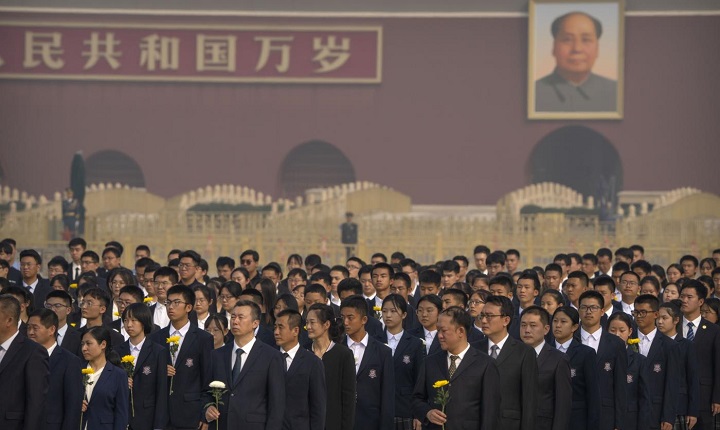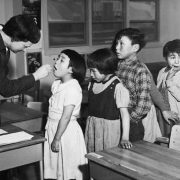
A specter is haunting China’s Communist Party Congress, the C.U.T.E. specter.
Due to open on October 16, the congress will have to provide satisfactory answers to two questions (Covid and Ukraine) and two issues (Taiwan and Economy)—hence the acronym, and there is nothing cute about it.
Besides all the personnel adjustments, the party will make moves and choose people by defining themes and projects. Then these answers will also guide which people’s profiles to choose from.
Certainly, the party, like to some extent the Catholic Church with its tight organization, can push through even half-baked but satisfactory answers. “Satisfactory” means the answers must fit the party logic, which is not the same as in other parts of the world.
Still, the answers must be credible enough to be swallowed by the 2,296 delegates, who then have to feed them to their underlings and through them to 1.4 billion Chinese people. The process hinges on that credibility, which, if not strong enough at the source, will run thin at the mouth of the river of discourse.
The need to put forth credible arguments may force the party also to make massive turns. “Credible,” in turn, is defined by pragmatic evidence supporting one thesis or another.
There is, of course, a good degree of tinkering with facts to make them fit a theory. But in the end, something feasible must come out.
Here is the snag, as C.U.T.E. is pretty ugly.
Covid
The fight against Covid was ideologized. At its onset, the West believed the epidemic would show the Chinese system was finished. On the contrary, with its lockdowns, impossible in Western countries, China claimed it proved authoritarianism could save lives.
Two years later, roles have reversed. Western technology produced an effective vaccine and its free society spread herd immunity. In short, Covid became endemic, and de facto turned into some kind of seasonal flu. Conversely, China still doesn’t have a suitable vaccine, and its social discipline didn’t deliver herd immunity. Hence, Covid is still a scourge on Chinese lives, people are scared of getting sick and dying, and their livelihoods and the economy sank.
Moreover, despite its vaunted leaps, Chinese technology is still behind America when and where it counts. The US produced a cure, but China didn’t and still doesn’t. If China wants to get over the epidemic, will it have to be once again healed by the Americans? It could be humbling—or not.
The question to be credibly answered is thus: Does all this prove that China’s system is less effective than Western liberalism? If so, liberalism must be effective in some weird and not entirely explicable way since no one can really put his finger on how the West came out of Covid and is still standing.
Is Adam Smith’s “invisible hand” the holy ghost of society? Should China recover Laozi’s wuwei, the non-action that inspired the “invisible hand”[1]? After all, Hanfeizi, back in fashion now in China, was the first commentator to Laozi. Should China turn around? And where? How?
These are the questions hanging over Congress. They can be swept under the rug for a while but will have to be answered sometime and somehow; otherwise, they’ll make the party trip over the growing lump on the floor.
Ukraine
China swallowed the Russian story hook, line, and sinker on the Ukraine invasion. It turned out that Russia failed in its promises to conquer Ukraine in two weeks or eight months, to split the EU, and to expel the US from Europe. What does it say about Russia and also about the Chinese believing the Russians? Does it mean that Russia and its Soviet legacy are rotten, and Gorbachev was right trying to reform it to the core?
What does it say about China, which believed the story of Gorbachev’s failings for 30 years? Plus, what does China’s trust in Russian promises say about China’s ability to understand the world?
What would China do if Russia split up like the USSR or became more Western? Did it compute and hedge these issues at the beginning of the war?
Again, the party can hide these questions, but the more it tries to do so, the bigger they’ll eventually become.
Taiwan
Taiwan is quickly drifting out of China’s orbit because of Ukraine.
This is because of a change in thinking. Most observers thought the Ukrainian invasion was impossible, but were proved wrong. The rebuttal created a precedent: Now, nobody can rule out events that look “impossible.” Then the invasion of Taiwan needs to be considered a real possibility.
This draws more international support to Taiwan, and thus pushes the island away from China. With a weaker pull on Taiwan’s reunification, the whole nationalist agenda that has driven China’s ideology since the late 1990s becomes feebler.
If so, China misses an idea holding the country together. Is China going to drop Taiwan and put it on the backburner? Will it drop the nationalist agenda? If so, what will be the explanation or the replacement ideology?
If it doesn’t, how can it stick to it, and with what arguments?
In this ideological trap, there is only the economy upholding the country. China’s miracle economy was the backbone of China’s success, but now it is also a problem.
Economy
Covid suppressing domestic consumption, excessive domestic debt for public spending and infrastructure, the bursting of the real estate bubble, the RMB not being fully convertible, and limits on market access, plus international tensions, are all tanking the Chinese economy.
Forty years of constant growth and the dream that next year will be better than the one before are ending. The reasons are complex, and the solutions available are all scary for their potentially disruptive consequences. The issue had been there for a long time, and for a long time, many in the leadership thought it could be ignored.
In 2013, President Xi Jinping wanted a drastic reform of state-owned enterprises (SOE), a root cause of the problems, but was pushed back, and SOEs are still there standing.
Now it is as if all debts are being collected at once.
What can be done to restart the economy? What will Chinese society be if it gives up on the idea of a better future? Pushing infrastructure spending, as the government plans to do, will only further inflate debts. Meanwhile, the ballooning export surplus intensifies international trade disputes. Then what?
The elders
But then, who can voice these underlying concerns? The leaders handpick the delegates, and they certainly won’t embarrass their mentors.
But the party has the elders.
Mao didn’t have any elders behind him. He established a new ruling dynasty, and the elders from the previous “dynasties” were simply put out to pasture.
Deng gathered all the party elders with him. They were the founding fathers of the revolution, the war veterans. People who rose after, who joined the party after it came to power in 1949, have much less clout.
Xi Jinping, son of one of those elders, Xi Zhongxun, rose thanks to the elders’ favor and then marginalized them. Still, he could not eliminate them because they were the reason for his power. They were put in a freezer. It was a conundrum—they were there and not there—but it was all fine until significant issues arose.
Yet if Song Ping, 105, a war hero, woke up and allegedly criticized Xi Jinping, what can be done? Put a gag order on all elders? Confine them? All options are difficult in the present party structure.
***
Even if none of these issues will be openly discussed in congress, it’ll still be tricky.
The delegates, marshaled to the monumental Great Hall of the People and held in hotels nearby, will chit chat over a cup of tea or huddled in buses on the way in or out of official meetings. Also, their staff and secretaries will exchange glances and gossip, and report back to their bosses.
Then perhaps if the leadership doesn’t face the issues head on, they could grow in the shade.
The congress in any event will be a success. The Party is set to turn away from the Zero-Covid policy and it is already distancing itself from the Russian war in Ukraine. Taiwan is a problem but Mao didn’t solve it, why should Xi crack it? The economy is a mess but all the big mistakes leading here were made by Xi’s predecessors; Xi actually tried to unravel them by tackling SOEs a decade ago.
Furthermore, if China is in trouble others are worse off. America is split because of Trump and woke ideologies; Europe is plagued by its gas dependency and internal fighting and bickering. The UK is collapsing out of the EU; Japan had its Premier killed by a fanatic. In comparison China may look safe, and Xi, despite it all, looks lucky, according to Beijing’s perspective.
The Congress could be a triumph and maybe because of that, the leadership should try address C.U.T.E. before it’s too late. Also, because China’s present optimism in its comparisons could be temporary and misplaced. Global events can go sour rapidly and unexpectedly, as Covid and Ukraine showed, and the next surprise could be even tougher for Beijing.
[1] See Lanxin Xiang The Quest for Legitimacy in Chinese Politics: A New Interpretation, 2021





